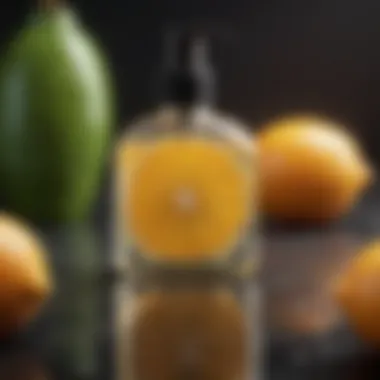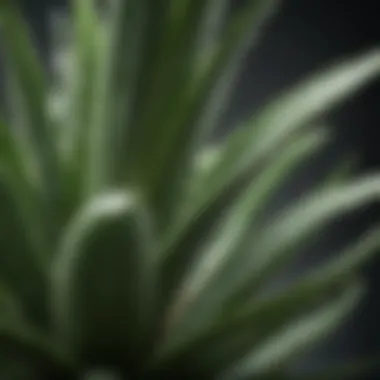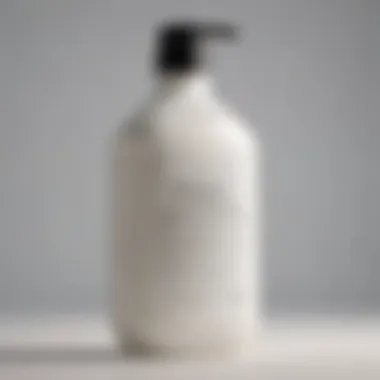Effective Home Remedies for Managing Hard Water Woes: A Comprehensive Guide


Fashion Trends
Latest Fashion Trends
Hard water affects more than just your pipes - it can impact your wardrobe too. Discover how to combat the effects of hard water on your clothes and keep your fashion game strong. Enhance your knowledge with tips on choosing fabrics that resist limescale buildup.
Seasonal Fashion Trends
Transition effortlessly between seasons without compromising your style. Learn how hard water can dull your clothing colors and how to revive them using simple home remedies. Stay ahead of the fashion curve with insights into protecting your favorite garments from hard water damage.
Dating Tips
Online Dating
Navigating the world of online dating can be challenging, especially when hard water wreaks havoc on your skin. Uncover solutions to maintain a glowing complexion for that all-important profile picture. Discover how to combat dry, brittle hair caused by hard water, ensuring you show up for that virtual date looking your best.
First Date Ideas
Planning the perfect first date? Hard water woes need not dampen the mood. Explore creative date ideas that take into account the impact of hard water on your skin and hair. From outdoor adventures to cozy indoor settings, make a memorable impression without letting hard water concerns steal the spotlight.
Relationship Building
Build a strong foundation for your relationship by addressing hard water challenges effectively. Delve into holistic approaches to combat limescale buildup in your living spaces, creating a nurturing environment for you and your partner. Strengthen your bond while tackling common hard water issues together.
Inspirations and Style Tips
Discover outfit inspirations that not only reflect your personal style but also stand the test of hard water exposure. Unlock the secrets to maintaining your wardrobe's freshness and vibrancy despite living in a hard water area. Stay on-trend with styling tips that account for the impact of hard water on clothing textures and colors.
Understanding Hard Water
Hard water is a common issue that many households face, impacting various aspects of daily life. In this article, we delve deep into the significance of understanding hard water and how it affects not only our health but also our home maintenance routines. By shedding light on the intricacies of hard water, we equip readers with valuable knowledge to tackle this pervasive problem effectively.


What is Hard Water?
Hard water refers to water containing high mineral content, primarily calcium and magnesium ions. This mineral-rich composition occurs through the absorption of these ions as water passes through rocks and soil. The presence of these minerals leads to various challenges, such as limescale buildup and reduced lathering of soaps and detergents.
Causes of Hard Water
The leading cause of hard water is the geological makeup of the region's water sources. Areas with limestone or chalk deposits tend to experience harder water due to the high calcium carbonate content in these rocks. Additionally, human activities like mining and industrial processes can introduce more minerals into water sources, exacerbating the hardness levels.
Signs of Hard Water
Detecting hard water in your home can be quite straightforward. Common signs include a white residue on faucets and appliances, dry and dull hair after washing, and soap scum buildup in showers. Observing these indicators can help homeowners take proactive measures to address the issues associated with hard water effectively.
Impact of Hard Water on Home and Health
Hard water poses significant challenges not only to human health but also to the integrity of homes. The mineral deposits present in hard water can wreak havoc on plumbing fixtures, appliances, and the overall cleanliness of homes. Additionally, the effects of hard water on hair and skin can be detrimental, leading to dryness, irritation, and dullness. Cleaning becomes a strenuous task with hard water, as soap scum and limescale buildup require extra effort to remove. Understanding the impact of hard water on both home maintenance and personal health is crucial to implementing effective remedies.
Effects on Plumbing Fixtures
Hard water can cause an array of issues on plumbing fixtures, such as faucets, showerheads, and pipes. The mineral deposits accumulate over time, restricting water flow and eventually leading to blockages. Additionally, hard water can corrode metal fixtures, reducing their lifespan and causing potential leaks. Maintaining plumbing fixtures in areas with hard water requires regular cleaning and descaling to prevent long-term damage.
Effects on Hair and Skin
For hair and skin, hard water can strip away natural oils, leaving them dry and brittle. The mineral buildup can weigh down hair, making it appear lifeless and dull. Skin, on the other hand, may experience irritation and sensitivity due to the harshness of hard water. To combat these effects, individuals must adopt specific care routines and products suited for mitigating hard water damage.
Challenges in Cleaning with Hard Water
One of the primary challenges of cleaning with hard water is the difficulty in lathering soap and detergents effectively. Soap scum forms easily on surfaces, necessitating frequent cleaning to maintain a hygienic environment. Furthermore, limescale buildup on shower doors, tiles, and appliances can be stubborn to remove, requiring specialized cleaning agents. Overcoming these challenges involves implementing targeted cleaning strategies and utilizing remedies tailored for combating the adverse effects of hard water.
Home Remedies for Combating Hard Water Woes
In this article about effective home remedies for dealing with hard water issues, we delve into practical solutions to combat the challenges presented by hard water. From addressing limescale buildup to safeguarding the quality of your skin and hair, these remedies offer natural and efficient alternatives for individuals experiencing the effects of hard water in their daily routines.
Natural Water Softening Techniques


Vinegar Soaks
Vinegar soaks play a pivotal role in softening water naturally. Their acidity helps break down minerals in hard water, making it gentler on your skin and hair. The key characteristic of vinegar soaks lies in their versatility; they can be used in various applications, from cleaning fixtures to conditioning hair. Despite their effectiveness, vinegar soaks may have a strong odor, which can be a drawback for some individuals.
Baking Soda Applications
Baking soda is another essential ingredient in combating hard water effects. Its alkaline nature helps neutralize the acidity of hard water, resulting in improved cleaning outcomes and softer water for personal use. An advantage of baking soda applications is their affordability and availability, making them a popular choice for home remedies. However, excessive use of baking soda can lead to skin dryness, so moderation is key.
Lemon Juice Mixtures
Lemon juice mixtures are a refreshing way to counter hard water challenges. The citric acid in lemons helps dissolve minerals, preventing limescale buildup and leaving surfaces cleaner. A unique feature of lemon juice mixtures is their pleasant scent, adding a fresh aroma to your cleaning routine. One downside of using lemon juice is its potential to corrode certain surfaces over time.
Essential Oils for Softening Water
Lavender Oil
Lavender oil is renowned for its soothing properties and its ability to soften hard water effectively. Its calming scent enhances relaxation while contributing to water softening tasks. The unique feature of lavender oil is its multipurpose use, from skincare to laundry, making it a versatile choice for combating hard water effects. However, some individuals may be sensitive to the fragrance of lavender oil.
Tea Tree Oil
Tea tree oil is a powerful natural remedy for softening water due to its antimicrobial properties. It not only helps soften hard water but also aids in cleansing and purifying. The key characteristic of tea tree oil is its versatility, as it can be used in various DIY solutions for hard water-related issues. Despite its benefits, tea tree oil may cause skin irritation in some individuals.
Eucalyptus Oil
Eucalyptus oil is a refreshing choice for softening water and combating hard water effects. Its invigorating scent uplifts the atmosphere while promoting a spa-like experience in your everyday routines. The unique feature of eucalyptus oil is its ability to invigorate the mind and body while addressing hard water challenges. However, individuals sensitive to strong fragrances may find eucalyptus oil overpowering.
DIY Solutions for Limescale Removal
White Vinegar Sprays
White vinegar sprays are effective in removing limescale buildup due to their acidic nature. They help break down mineral deposits, leaving surfaces clean and shiny. The key characteristic of white vinegar sprays is their affordability and eco-friendliness, making them a popular choice for environmentally conscious individuals. However, prolonged use of vinegar may tarnish certain finishes.


Citric Acid Cleansers
Citric acid cleansers are a powerful ally in combating limescale and hard water stains. Their acidic properties make them effective in dissolving mineral deposits without harsh chemicals. The unique feature of citric acid cleansers is their biodegradability, ensuring they are environmentally friendly. However, individuals with sensitive skin should use citric acid cleansers with caution.
Salt and Lemon Paste
Salt and lemon paste offer a natural and abrasive solution for tackling tough limescale and hard water residue. The abrasive texture of salt combined with the acidic properties of lemon helps scrub away stubborn stains effectively. The key characteristic of salt and lemon paste is their exfoliating power, leaving surfaces pristine and shiny. However, the abrasive nature of this mixture may not be suitable for delicate surfaces.
Protecting Hair and Skin from Hard Water Effects
Apple Cider Vinegar Rinses
Apple cider vinegar rinses provide a pH-balancing solution for hair exposed to hard water. They help remove mineral buildup, leaving hair softer and shinier. The key characteristic of apple cider vinegar rinses is their ability to restore hair health naturally. However, the strong scent of vinegar may be off-putting to some individuals.
Aloe Vera Moisturizers
Aloe vera moisturizers offer hydration and protection for skin affected by hard water. The soothing properties of aloe vera help alleviate dryness and irritation caused by exposure to hard water. The unique feature of aloe vera moisturizers is their lightweight texture and quick absorption, making them ideal for daily use. However, individuals with aloe vera allergies should perform a patch test before using.
Cold Water Rinse after Shower
A cold water rinse after a shower is a simple yet effective way to seal moisture and nutrients into your skin and hair. It helps close the hair cuticles, making hair smoother and shinier, while also preventing skin dryness post-shower. The key characteristic of a cold water rinse is its invigorating effect on the skin and scalp. However, some individuals may find cold water rinses uncomfortable during colder seasons.
Enjoy implementing these practical home remedies to combat the challenges of hard water and restore balance to your daily routines!
Additional Tips and Precautions
In the realm of combating hard water challenges, embracing additional tips and precautions holds paramount significance. These elements play a pivotal role in augmenting the efficacy of home remedies and ensuring long-term solutions. By delving into the intricacies of maintenance, cleanliness, and professional consultation, individuals can navigate the perplexing waters of hard water dilemmas with finesse.
Maintaining Water Appliances
Safeguarding water appliances against the corrosive effects of hard water entails a diligent approach towards upkeep. Regular inspection and cleaning routines are instrumental in preserving the functionality and longevity of fixtures such as faucets, showers, and washing machines. By incorporating descaling agents and protective coatings, one can shield these appliances from the detrimental impact of mineral buildup. These proactive measures not only enhance performance but also contribute to cost savings by averting expensive repairs or replacements.
Regular Cleaning Regimens
Establishing consistent cleaning protocols in a hard water environment is indispensable for upholding a hygienic and aesthetically pleasing living space. Employing non-abrasive cleansers and microfiber cloths can effectively combat the stubborn residues left behind by hard water. Focus on areas prone to limescale accumulation, such as sinks, countertops, and glass surfaces, to maintain pristine surroundings. Periodic deep cleans using eco-friendly detergents and natural disinfectants can mitigate the adverse effects of hard water, fostering a healthy and inviting home environment.
Consultation with Professionals
When grappling with persistent hard water issues, seeking expertise from professionals in the field can offer invaluable insights and tailored solutions. Water quality specialists possess the knowledge and resources to conduct thorough assessments, diagnose underlying problems, and recommend personalized remediation strategies. From water softening systems to specialized treatments, collaborating with experts can streamline the process of mitigating hard water woes and safeguarding the integrity of your home infrastructure. Prioritize consultations with accredited professionals to embark on a journey towards pristine water quality and optimal well-being.



